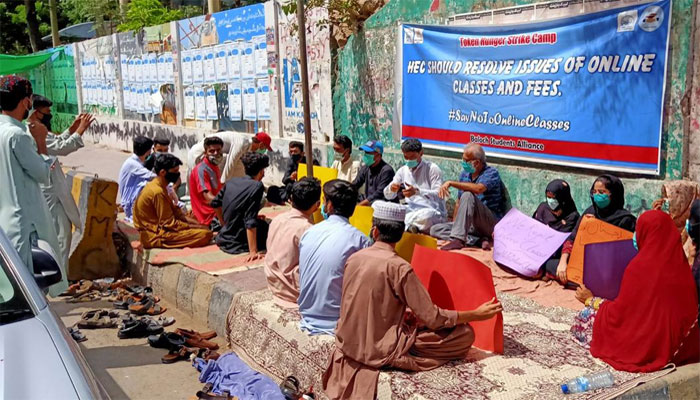Balochistan’s students seek Internet access for online classes
Javed Jan, a graduation student of the Quaid-e-Azam University, Islamabad, is worried about his academic future. For the past three days, the 24-year-old has been taking part in a protest, along with dozens of other students, against the unavailability of the Internet service in his hometown, Kech district, in Balochistan.
After sitting on a token hunger strike outside the Karachi Press Club, the protesters organised a rally on Thursday from Arts Council to the press club to demand from the government to provide them the Internet service and electricity in Balochistan to pursue their higher education online.
The students are studying in various universities and colleges across the country and had returned to their hometowns in Balochistan, mainly in the Makran region, after universities across the country were ordered shut as part of a nationwide coronavirus lockdown.
An uninterrupted access to the Internet has become a vital for a majority of students in the remote areas of Balochistan after Pakistan’s Higher Education Commission (HEC) directed all universities to switch to online classes in view of the lockdown to limit the spread of the coronavirus in the country.
“The HEC should revisit its policy of online classes for Balochistan because most of the areas in the province lack the basic facilities of electricity and Internet,” said Jan. “The majority of students do not own even laptops or smartphones.”
Several student groups, including the Baloch Student Action Committee, Baloch Students Council Islamabad, Baloch Educational Council Karachi, Baloch Educational Council Bahawalpur, Baloch Students Council Multan and Baloch Students Council Lyari, jointly organised the three- day protest.
They arranged donations to arrange transportation for students from various districts of Balochistan to participate in the protest in Karachi in the hope that the mainstream media could highlight their demand for the provision of Internet services.
Because of the coronavirus pandemic, the authorities did not allow the protesters to put up a tent and therefore they recorded their protest by sitting, without any shade, outside the Karachi Press Club in the sweltering weather.
Protesters at the rally said that before taking decisions on online classes, the government should have provided the necessary facilities of Internet and electricity in Balochistan. To attend the online classes, the students had to shift to Quetta, but most of the students could not afford to move there, they said, adding that even in cities like Quetta, hostels were already closed because of the coronavirus pandemic.
“Even if they arrange a big room to live jointly in the cities with other students, there will be a high risk of catching the coronavirus infection and our families are not ready to take that risk,” said another protester.
In late February of 2017, before beginning to collect the population census data, 3G/4G mobile Internet services were suspended in the Kech district and other districts of Balochistan. The sole reason given was “security”.
Over three years later, 3G/4G services remain suspended, and now the recent flood had ensured that even wired Internet connections were no longer functioning, protesters said. The students appealed to the government and the Higher Education Commission to reconsider this educational plan and save their academic careers from being ruined.
-
 Jennifer Aniston Already Decided Her Wedding Dress?
Jennifer Aniston Already Decided Her Wedding Dress? -
 Prince Harry, Meghan’s Hollywood Party Drama Exposes Chaotic PR Strategy
Prince Harry, Meghan’s Hollywood Party Drama Exposes Chaotic PR Strategy -
 Jennifer Garner Reacts To Savannah Guthrie's Video As Search For Nancy Guthrie Continues
Jennifer Garner Reacts To Savannah Guthrie's Video As Search For Nancy Guthrie Continues -
 Bad Bunny Leaves Fans Worried With Major Move After Super Bowl Halftime Show
Bad Bunny Leaves Fans Worried With Major Move After Super Bowl Halftime Show -
 Captain Jason Talks Personal Hardships He Faced Ahead Of 'Below Deck' Season 4
Captain Jason Talks Personal Hardships He Faced Ahead Of 'Below Deck' Season 4 -
 Anti-monarchy Group Reacts To Prince William, Kate Middleton Statement On Epstein Scandal
Anti-monarchy Group Reacts To Prince William, Kate Middleton Statement On Epstein Scandal -
 Andrew 'must' Apologize Not Wider Royal Family For Jeffrey Epstein Links
Andrew 'must' Apologize Not Wider Royal Family For Jeffrey Epstein Links -
 Super Bowl 2026: Why Didn't Epstein Survivors Ad Air On TV?
Super Bowl 2026: Why Didn't Epstein Survivors Ad Air On TV? -
 'Harry Potter' TV Series Exec Teases 'biggest Event In Streaming': Deets
'Harry Potter' TV Series Exec Teases 'biggest Event In Streaming': Deets -
 Camila Mendes Finally Reveals Wedding Plans With Fiancé Rudy Mancuso
Camila Mendes Finally Reveals Wedding Plans With Fiancé Rudy Mancuso -
 Beatrice, Eugenie Blindsided By Extent Of Sarah Ferguson’s Epstein Links
Beatrice, Eugenie Blindsided By Extent Of Sarah Ferguson’s Epstein Links -
 Girl And Grandfather Attacked In Knife Assault Outside Los Angeles Home
Girl And Grandfather Attacked In Knife Assault Outside Los Angeles Home -
 Super Bowl Halftime Show 2026: What Did Trump Say About Bad Bunny?
Super Bowl Halftime Show 2026: What Did Trump Say About Bad Bunny? -
 Piers Morgan Defends Bad Bunny's Super Bowl Performance, Disagrees With Trump Remarks
Piers Morgan Defends Bad Bunny's Super Bowl Performance, Disagrees With Trump Remarks -
 Andrew Lands In New Trouble Days After Royal Lodge Eviction
Andrew Lands In New Trouble Days After Royal Lodge Eviction -
 Instagram, YouTube Addiction Case Trial Kicks Off In California
Instagram, YouTube Addiction Case Trial Kicks Off In California




